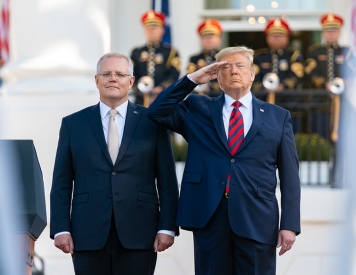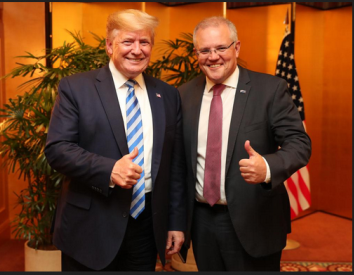Forget about helping a fellow countrymen in peril overseas, Australia’s elected representatives are utterly indifferent to the fate of Julian Assange and have thrown him to the wolves, writes Kellie Tranter.
THERE'S AN OLD SAYING:
‘Throw me to the wolves and I’ll return leading the pack.'
Even though Julian Assange – an enigmatic individual who has overturned conformity – now has a long historical presence, it is evident that Australia’s elected representatives, by and large, are completely indifferent to his fate, irrespective of guilt or innocence.
When bad things happen to our fellow countrymen at the hands of any state, it’s natural for citizens to ask whether their government did all it could do to keep them out of harm’s way. This question may be asked one day about Assange — and when it is, there is little doubt our Government’s actions will be found wanting.
In 2012, former Attorney-General Nicola Roxon wrote to Assange’s lawyers confirming that
'Australia would not seek to involve itself in any international exchanges about his future.'
Assange sought political asylum in the Ecuadorean embassy in London because of well founded fears that extradition to Stockholm would facilitate his ultimate extradition to the United States.
Since then, both Assange and his lawyers have consistently argued that, under Swedish law and under mutual legal assistance, Swedish prosecutors could interview Assange in London in relation to sexual assault allegations.
It is only now, over four years since the allegations surfaced and, after Assange was recently granted an appeal hearing by Sweden’s Supreme Court, that Marianne Ny, Director of Public Prosecution in Sweden, is going through the motions to do exactly that: what they were always permitted but chose not to do.
BBC News - #EXTRADITION Sweden grants Julian #Assange appeal over rape allegation http://t.co/UMRmnWo3Jz
— Peters & Peters (@PetersandPeters) April 29, 2015
One would think that Sweden’s ongoing treatment of an Australian citizen in this way would prompt diplomatic rumblings, public denouncements, letters to counterparts and calls by Cabinet for immediate detailed legal advice from Australia’s current Attorney-General. Yet silence has ensued.
Generally, the Australian Attorney-General has policy, legal services and public interest functions. As far as WikiLeaks and Assange are concerned, a freedom of information laws request confirms that, since the appointment of George Brandis as Attorney-General in 2013, the only Government documents relate to the publication by WikiLeaks of the Victorian Supreme Court Order relating to Securency & Note Printing Australia.
In Opposition, Foreign Affairs Minister Julie Bishop was urging the Australian Government to give Assange whatever consular support any other Australian citizen should expect in these circumstances.
She was, she said,
"... deeply concerned by the prejudicial statements that have been made by government ministers in the past."
Bishop went on to accuse former Senator Bob Carr of misleading parliament over what he knew about the United States’ plans to extradite Assange.
But three months before the 2013 Federal election she was affirming bipartisan support for the Government’s handling of Assange’s circumstances and had accepted the assurances of U.S. ambassador Jeffrey Bleich that the U.S. government was not interested in extraditing the WikiLeaks publisher.
Julie Bishop accepted assurance of ambassador that US not interested in extraditing Julian Assange(!) Vote #WLP http://t.co/LBjxdg96SB
— The WikiLeaks Party (@WikiLeaksParty) June 18, 2013
Clearly, the views of the then U.S. ambassador trumped the assessment made by the experienced and respected human rights lawyer, Gareth Peirce, that a sealed indictment was very likely to have been issued for Assange and that a sealed U.S. extradition request was ready to be issued, if it had not been issued already.
Just last week, it was reported that the United States
‘"... Department of Justice is conducting an investigation, and it remains ongoing,” says a Department of Justice spokesperson by email.’
In 2013, Ms Bishop did at least confirm that the Coalition considered WikiLeaks’ activities “to fall within the realms of journalistic endeavour”, but qualified that by adding that the trial of US Army Private Manning might
“... cast further light on whether WikiLeaks breached any US laws in obtaining that information.”
By November 2013, the newly appointed minister for foreign affairs had come around to the view that
“Australia has provided appropriate consular support to Mr. Assange. He chose to seek political asylum in the Ecuadorian Embassy, but the Australian Government has provided appropriate level of consular support throughout the challenges that he has faced. There are court proceedings in Sweden, there are court proceedings in Britain, he has had access to those court proceedings, he has had support from lawyers and I am satisfied that we provided an appropriate level of consular support. At any time, there are hundreds of Australians in trouble overseas in one form or another and I have judged that the support that we have given to Mr Assange is appropriate in the circumstances.”
John Shipton, Julian Assange's dad, suing Abbott & Bishop for calling him "stupid" & "reckless": http://t.co/0i2Owg33aR #freespeech
— Sarah Joseph (@profsarahj) January 2, 2014
In December 2013, documents produced under Freedom of Information laws revealed one cable from Washington in relation to Defence procedures for granting and renewing security clearances ‘due to ‘Snowden and Manning security breaches’. No mention was made of Assange or WikiLeaks.
Documents produced pursuant to a further Freedom of Information request in April 2015 included a cable from the United States in relation to a November 2013 Washington Post report that the U.S. Justice Department had 'all but concluded' that it would not bring charges against Assange. Some information appears to have been redacted from the documents produced, so it is unclear whether any contrary view was expressed.
All other documents produced provide no further information about or insight into the investigation or potential prosecution of Assange or WikiLeaks in the United States.
To mark the 1,500 days spent by Assange in the United Kingdom without charge, I wrote to the Senate crossbenchers in January.
Responses from the offices of Senators Dio Wang, Jacqui Lambie and Bob Day essentially were formal or evasive.
Senator Wang’s office on Senator Wang’s behalf stated that he,
‘...acknowledges, has reviewed and offers no comment with regard to the matter raised…’
Senator Day’s office:
‘Senator Day appreciates the time you have taken to express your view on this important issue and will take these views into consideration. Senator Day appreciates that you have written to him about a current issue that concerns you. The Senator has been elected as a Family First Senator for South Australia on a platform of “Every family, a job and a house”. This is a massive task which promotes independence and self-reliance, reducing the need for government intervention. This leads to smaller government, lower taxes and therefore more money in the pockets of families. Senator Day therefore has a limited capacity to advocate for (a) issues outside of his State or (b) policy priorities beyond that focus. Having said that, Senator Day has indicated above what he has to say about the issues that you have raised.’
Edward Snowden, Julian Assange and Chelsea Manning statues unveiled in Berlin http://t.co/g12NSjH11Z pic.twitter.com/MUR9TAtLTf
— Mashable (@mashable) May 4, 2015
Senator Lambie’s office:
‘I have forwarded this to the senator, but I believe that due to it being before the courts and a sensitive issue, it might not be responsible to voice an opinion in the parliament.’
But it was the response from self-proclaimed libertarian, Senator David Leyonhjelm, which was the most disappointing, in that he obeys the atmosphere by following the U.S. Department of Justice line:
‘Mr Assange is under investigation for crimes of sexual assault. He is hiding in the Venezuelan embassy to avoid facing them, not because of his political views or activities. Until he faces these accusations properly, I will not seek to either move a motion to refer his case to a committee and/or to raise Questions on Notice in the chamber.’
Senator Leyonhjelm not only named the wrong embassy, but he failed to acknowledge that Assange was granted asylum only after a formal assessment by the government of Ecuador in relation to the current and future risks of persecution and the cruel, inhuman and degrading treatment in the United States in response to his publishing activities and political opinions.
At least those Senators did respond. No response at all has yet come from Senators Xenophon, Lazarus, Muir, and Madigan.
I suppose, to some extent, Julian Assange being holed up in the Ecuadorian Embassy in London has become old news for some. Much has happened in the last four years, with significant world events reported upon more quickly, comprehensively and vigorously than ever before, and the Assange/WikiLeaks revelations having been followed by the equally sensational Snowden revelations and their immense international political fallout.
However, that does not in any way diminish the importance of how Assange has been treated and how he has been thrown to the wolves by his own country.
The great lengths to which the Australian Government has gone to assist other Australian citizens accused of crimes and jailed in other countries over the last four years, illustrates the capacity our government does have to provide effective diplomatic assistance when it chooses to do so. It has never chosen to do so in respect of Julian Assange.
Instead it has simply asserted that it has provided appropriate assistance, but it has taken no active steps to look at what its ally the United States has been trying to engineer, or to objectively assess Assange’s situation in relation to the allegations being made against him, purely on the basis of his personal position as an Australian citizen.
This represents a profound failure on the part of the Australian Government in terms of its obligations to one of its citizens.
Kellie Tranter is a lawyer and human rights activist. You can follow her on Twitter @KellieTranter.

This work is licensed under a Creative Commons Attribution-NonCommercial-NoDerivs 3.0 Australia License
Monthly Donation
Single Donation
Australian AG George Brandis saying Julian #Assange should "man-up" ie. walk directly into US gvt custody http://t.co/He1DR4kGCS @wikileaks
— The Justice Campaign (@thejustcampaign) July 16, 2014
Real freedom of speech. Subscribe to IA from just $5.









